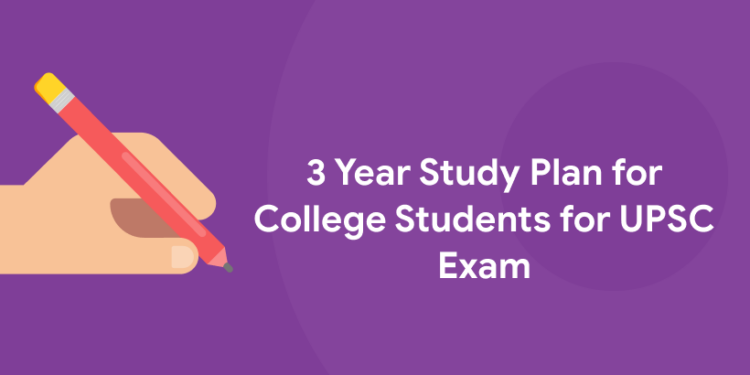Table of Contents
Preparing for the UPSC exam requires a well-structured study plan, especially for college students who have limited time alongside their academic commitments. In this article, we present a comprehensive 3-year study plan tailored specifically for college students aiming to crack the UPSC Civil Services exam. Let’s dive into each year’s focus and essential steps to follow.
Prepare strategically for the UPSC exam! Get Free Demo Classes Here!
3 Year Study Plan for UPSC Exam: Download Free PDF
Many students learning for the UPSC often ask how to schedule their preparation for a successful outcome. If you are serious about passing the test, a three-year strategy is the way to go. A 3-year plan focuses on a gradual increase in the difficulty of syllabus and topics, resulting in improved understanding and clarity. A 3-year UPSC study plan in PDF format is available. Find a convenient 3-year UPSC study plan in PDF format.
Click on the link below to download UPSC 3 Year Study Plan for UPSC
Year 1 UPSC Study Plan:
1: Which one of the following is not a Harappan site?
1. Familiarize yourself with the UPSC exam pattern and syllabus:
Understand the structure and requirements of the exam. Refer to the official UPSC website for detailed information. UPSC Syllabus outlines all the details regarding the subjects and topics you need to cover before the exam, and you can prepare your study timetable accordingly. By following the syllabus and understanding the latest exam pattern, you can improve your writing skills, understand the repeated topics asked, develop time management skills, and score higher points in the UPSC exam.
To know the latest UPSC syllabus, Play the video below, now!
2. Develop a strong foundation in General Studies (GS) subjects such as History, Geography, Polity, Economy, and Science by referring to NCERTs and standard textbooks.
Study subjects like History, Geography, Polity, Economy, and Science by referring to NCERT textbooks and standard reference books. Creating a Strategy for Preparation General subjects of the UPSC Exam are notoriously difficult to master due to their complexity. However, a strong foundation in general studies is necessary to achieve the desired results. The UPSC exams assess a candidate’s knowledge and reliability, fortitude, capacity, and ability to handle challenging circumstances in life.
Click below to know the must-read books for preparation:
Must Read books for UPSC Preparation
3. Read newspapers daily to stay updated with current affairs.
Read newspapers daily to stay abreast of national and international news. The newspaper is a great resource of information. t is a primary source to get in touch with current affairs. It helps you keep up with world events such as politics, GK, the latest events, Sports, etc. So that you form the habit of reading the newspaper every day.
4. Start building your writing and analytical skills through regular essay writing and answer writing practice.
Regularly practice essay writing and answer writing to improve your articulation and critical thinking abilities. The ability to write well is a form of effective communication, which examinees necessary require. With good writing skills, you can transcribe your thoughts into meaningful messages, allowing you to express your ideas and improve your professional image. Additionally, you can improve your writing speed, and improve your time management skills, which is a must for UPSC and other competitive exams by practicing the same.
5. Join a coaching institute or online course for guidance and additional resources.
Seek guidance from experienced mentors and access additional study materials. Coaching institutes help applicants study systematically to ensure that they complete the course before the exam. They provide enough study materials, exam practice, mock tests, personal mentorship, one-to-one guidance, and other prerequisites that need to crack the exam. Coaching institutes track your performance by providing space for feedback, doubt clearing session, and personalized progress card, which helps you to crack the exam.
6. Take part in mock tests and analyze your performance.
Any exam preparation is incomplete until you practice the things you are studying. To achieve the best results, you must put your preparation to the test. Practicing mock tests give you a clearer idea of the types of questions that appear on the UPSC exam.
Excel in the UPSC exam with Expert Mentors! Get Trial Classes Here!
Year 2 UPSC Study Plan:
1. Continue with your GS preparation and revise the topics covered in the previous year.
Set aside an amount of your study time to go over the preceding question paper. Revision helps recall the details of the topic you have studied. Revising the topics increases learners’ confidence in attempting any related question in the exam. Timely revision can assist minimize a student’s anxiety and stress levels during tests.
2. Start focusing on optional subjects based on your interest and strengths. Choose a subject that you find engaging and have a good understanding of.
A good start makes you feel more energised. Begin focusing on electives based on your interests and strengths. First, choose a topic that you are interested in and understand well.
3. Enhance your knowledge of current affairs through newspapers, magazines, and online sources.
Improve your GK and Current affairs knowledge by watching the news, reading newspapers, current affair magazine, etc. The topic could be about countries, politics, society, international affairs, history, culture, economy, games, or anything else that pertains to human life. Follow the general updates regularly and crack the test.
4. Practice answer writing regularly to improve your speed and presentation.
Develop your writing skills. By practicing, you can also improve your writing speed and time management skills, which are required for UPSC and other competitive exams.
5. Engage in group discussions or join study groups to exchange ideas and perspectives.
Collaborate with peers to exchange ideas and gain diverse perspectives. Group Discussion assists learners in processing information rather than receiving it. Leading a discussion takes different abilities than lecturing. The purpose of a discussion is to learn more from others and obtain additional course material. Group discussions assist students to strengthen their critical thinking skills, communication skills, self-confidence, and teamwork.
6. Continue taking mock tests and analyze your performance to identify areas of improvement.
Practicing mock tests will offer you a better understanding of the types of questions that may appear on the UPSC exam. You can be familiar with question paper patterns, repeated questions asked, and develop your time management abilities by attempting.
Looking for a clear path to crack the UPSC exam? Get Free Demo Classes Here!
Year 3 UPSC Study Plan:
1. Revise all the subjects thoroughly, paying attention to both GS and optional subjects.
Review all subjects, focusing on both GS and optional subjects.
2. Try to cover the syllabus for Ethics well in advance so that one has enough examples to substantiate key terms mentioned in the syllabus
Cover the Ethics syllabus in advance, gathering examples to substantiate key terms.
3. Develop a deeper understanding of the subjects and interlink concepts.
Develop a comprehensive understanding of subjects and establish connections between different topics. over a wide range of topics to improve speed, accuracy, and clarity in your answers.
4. Focus on current affairs by following newspapers, monthly magazines, and government reports.
Choose an optional subject based on your interest and strengths. Study it thoroughly with the help of recommended books and resources. Dive deeper into current affairs by referring to newspapers, magazines, and reliable online sources.
5. Practice answer writing extensively, covering a wide range of topics.
Regularly practice writing answers to questions, improving both speed and presentation.
6. Take part in mock interviews and personality development programs to enhance your interview skills.
Analyze your performance, identify weaknesses, and work on them. Participate in mock interviews and personality development programs to enhance your interview skills.
7. Stay motivated, maintain a positive mindset, and manage your time effectively.
Stay motivated, adopt a positive mindset, and manage your time effectively. Remember, this study plan is just a guideline. Adapt it according to your strengths, weaknesses, and available resources. Consistency, perseverance, and self-discipline are key to success in the UPSC Civil Services exam. Good luck with your preparation
Conclusion:
This 3-year study plan provides college students with a roadmap to navigate their UPSC exam preparation. Adapt the plan to suit your strengths, weaknesses, and available resources. Consistency, perseverance, and self-discipline are crucial for success. Remember, success in the UPSC Civil Services exam is a result of dedication and hard work. Good luck with your preparation!
Prepare systematically for UPSC Exam! Get Free Demo Here!
| Related Courses | ||
| RRB Exams Coaching | RRB JE Online Coaching | SSC JE Online Coaching |
| SSC Online Coaching | UPSC Online Coaching | Bank Exam Coaching Online |
Frequently Asked Questions
Why is it recommended to start preparing for the UPSC exam at least three years in advance?
Starting early allows students to cover the extensive UPSC syllabus without becoming overwhelmed. It permits sufficient time for conceptual clarity, modification, and practice, improving the likelihood of success.
How many hours should I study daily for UPSC preparation?
Aim for at least 6-8 hours of focused study daily, ensuring adequate time for revision and practice.
Can I clear UPSC with a full-time job?
Yes, many aspirants have cleared UPSC while working. Proper time management and dedication are crucial in balancing work and preparation.
How important is current affairs for the UPSC exam?
Current affairs play a significant role, especially in the prelims and main exams. Regular reading and revision of current affairs are essential.












